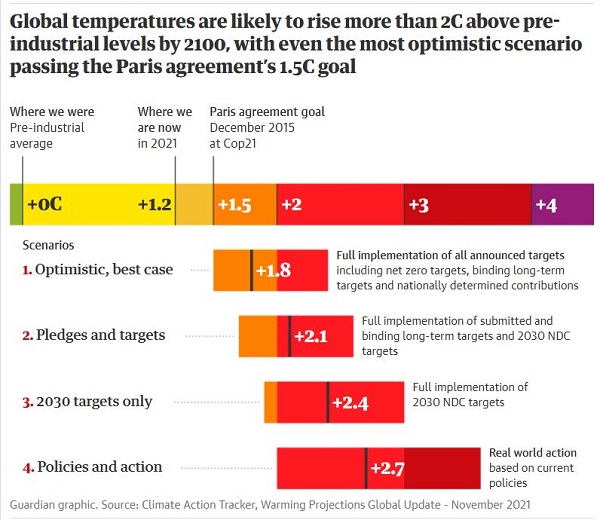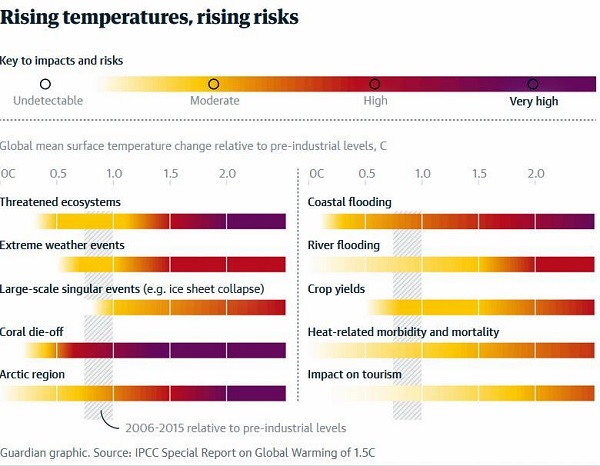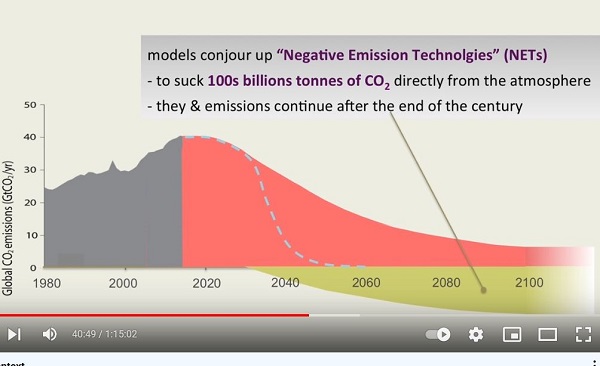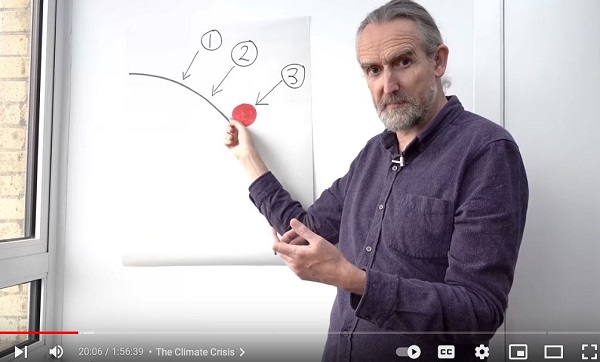A theme of the Glasgow Conference of Parties (COP) of the UN Framework Convention on Climate Change (UNFCCC) has been to ‘keep 1.5°C alive’ knowing that they would fail. This is where the new pledges would take us by 2100 according to Climate Action Tracker:

My point, however, is that in choosing the goal of 1.5°C the UNFCCC is choosing failure. Back in 1994 the UNFCC was set up to prevent dangerous climate change. This is a simple ‘burning embers’ chart produce by the IPCC in 2018:

Any child can see that for a safe climate 0.5°C is plenty far enough.
Kevin Anderson in a recent YouTube talking about Britain’s responsibility points out that the latest IPCC report says that for a 67% chance of remaining below 1.5°C is only 400Gt of CO2.
He says that the UK’s share in the energy sector would go in the next four years. He also says that the UK’s effort to date, reckoned to be one of the best in the world, is only worth half a cracker. The claim is that the UK has reduced emissions by 51% since 1990. However, when calculated properly, including shipping and air travel associated with Britain’s way of life, plus the emissions avoided by moving dirty industries offshore, the Brit’s have only achieved 15% or 0.5% pa.
There is more wrong with the IPCC statement.
Firstly, 67% means lousy odds, given the importance limiting warming. I’d reckon it should be 99.9999% (I think that is one in a million!)
Secondly, all scenarios from the IPCC now involve overshooting and negative emissions, or drawdown that goes on long after net zero in 2050. This slide comes from his January 2020 talk to Extinction Rebellion, Can meaningful hope spring from revealing the depth of our climate failure?:

Somewhere he says 6-10Gt pa, starting ASAP and continuing indefinitely. If you want to improve the odds, you have to suck more out.
Then if you want to aspire to reducing CO2 to 350ppm, for a safe climate, you need even more.
So, what are the chances of keeping the temperature under 1.5°C? Infinitesimal.
Can we draw hope? Anderson is full of ideas about what we can do, so if you get busy you may also hope.
Personally, much as I hate their methods, Extinction Rebellion is one of the few organisations that is clear-eyed about what our realistic prospects are.
Here’s Roger Hallam in How to fix climate in a few years:

The climate ball is about to go over a cliff.
More to come. I have to go bush for a few days, unexpectedly early. I want to say a bit more about tipping points, and the problem of climate justice, but there is a fair bit in the above for starters.

All I can say at present is that I’m back, earlier than expected.
I’m a bit tired now. Having traversed the Darling Downs twice, there are great sheets of water everywhere, but here in Ashgrove we had 14mm on Thursday, followed by 7mm on Friday. The Wivenhoe Dam, increased by a fraction, I think essentially from a bit that fell from the sky, which in the catchment it mainly didn’t.
However, the grass, shrubs and trees here grow while you are watching them. Having done no work since last Wednesday, I’ll have to go out and do a bit, because the plant world does not recognise weekends and public holidays.
Just heard on the radio, Glasgow ended on a down note. The two big things that happened were that China and US announced they will work together, which I think matters.
Secondly, India said developing countries need a triliion pa in aid, not $100 billion.
What did not happen is that the low lying countries did not say openly that 1.5 will see them drown anyway. They must know.
Essentially net zero by 2050 and the 1.5 limit to avoid the worst is a scam to allow the fossil fuel industries to keep perpetrating.
And any notion that reparations might be owing from the rich countries was absolutely avoided.
Australia?
Australia named ‘colossal fossil’ of Cop26 for ‘appalling performance’, granted this award for its ‘breathtaking ineptitude’.
Apparently our pavilion, sponsored by Santos, had the best coffee around.
“Apparently our pavilion, sponsored by Santos, had the best coffee around.”
“Sponsored by Santos” sort of tells it all in terms of LNP commitment to climate action.
Indeed, John. The Morrison gang see gas increasing to peak after 2040 and by 2050 still be larger 13% than now.
Here are some links out of Glasgow:
Cop26 reactions: ‘Rich nations have kicked the can down the road’
COP26: experts react to the UN climate summit and Glasgow Pact
Glasgow Climate Pact
COP26: ‘Blah, blah, blah’ as world nears climate ‘catastrophe’
Greta Thunberg:
Unless we achieve immediate, drastic, unprecedented, annual emission cuts at the source then that means we’re failing when it comes to this climate crisis. “Small steps in the right direction”, “making some progress” or “winning slowly” equals loosing.
(AU Climate Council) COP26 Ends With Stark Warning: Step Up On Emission Cuts This Decade Aus, Or Pay The Price
COP26 agreement to phase down coal not ‘a death knell’ for coal power says PM, disputing Boris Johnson
Why am I not surprised?
Cop26: Pacific delegates condemn ‘monumental failure’ that leaves islands in peril
At least UK chair Alok Sharma apologised.
From Vox, the best and clearest I’ve found so far:
What the world did and didn’t accomplish at COP26
The biggest climate conference in history was a tiny step toward solving a gargantuan problem.
We feature in The Fossil Fuelled 5
New paper exposes five wealthy countries whose fossil fuel production threatens chances of keeping 1.5ºC hope alive
The report, coined The Fossil Fuelled 5, finds that the gap between climate rhetoric and reality is dangerously wide, with wealthy nations – the UK, US, Canada, Norway and Australia – planning to approve and subsidise new fossil fuel projects which undermines their recent claims of leadership in addressing the climate crisis.
Stemming methane leaks from oil fields, pipelines and landfills could help us slow global warming quickly
Interesting read. Acting on methane may be able to produce some quick results.
This should be a separate post, but I don’t have time.
On Tuesday last week my sister had a significant birthday. A family celebration had been planned for Sunday at the Carinya aged care facility, which was her home, as it were.
Last Thursday she admitted to the Miles hospital with an illness. Her condition deteriorated rapidly, and around midday on Friday she passed away.
I’ve been to Miles and back, but arrived too late to see her. My younger brother and his son went out Thursday night, arriving 1.30am, and were able to provide support during her last hours.
At present we are doing what usually happens, talking a lot to each other, a lot of remembering about growing up on the farm (normal was to have 8 people in the house, and we often had more) and finding old photos etc etc.
The net result is that, for this blog, while there is manifest foolishness worthy of comment, I can’t give it too much attention. I’ve just checked the Five stages of grief, and I’d have to say I don’t have time to follow the script.
Can’t see the point of anger, denial, bargaining and depression. We are fine.
However, priorities will be out of my control for a bit so I can’t predict how much time I’ll spend here.
Australian researchers close in on low cost solar hydrogen tech, with no electrolysisers
Sounds like early days but it is worth keeping in mind that conventional electrolysis may not be necessary for producing solar hydrogen or whatever.
Sounds almost too good to be true, John.
Meanwhile James Hansen told Berliners what they should do with gas, which he sees as only a smidgeon worse than coal, while Rebecca Liebler at Vox says It’s time to freak out about methane emissions and our fearless leaders are going to pile some money into developing the Cooper and Adavale Basins plan to provide jobs and economic boost.
In the SMH we are told ‘No justification’: Government commits $285 million to gas development. Seems Tony Wood from Grattan thinks it’s all kosher as long as the government doesn’t spend money on it.
Just not that sense of urgency is there?
I’ve just had the experience of driving 1000klms across Europe in a Tesla90. 4 charging stops, could have been just 3 with tighter planning, but I always prefer to have more reserve than necessary. That proved a good idea when I deselected “Use Toll Roads” in Czechia an found myself on mountain one lane winding roads through picturesque villages in the dark, even having a family of deer burst out of the trees to cross my path just meters ahead. I may as well have selected “Seek Adventure” on the Navigation Computer.
The purpose of the trip was to talk to the company that will be manufacturing the PVT solar thermal panels that I have been alluding to for years. An extremely impressive company that serves the automotive industry in an amazing way, a company made impossible for Australia by the egotistical and ideological Liberals.
However, half way across Germany I got very depressed with the immense volume of Truck traffic, an indirect measure of CO2 emissions necessitated by our population and the life style we lead.
Positive is that these panels nationally installed will drop Australia’s fossil fuel electricity consumption by more than 25%. And this one company has the productive capacity to achieve that in just 10 years.
The reason why this project is getting underway now is that I need these panels on my boat (4 panels will provide 2 kw of solar thermal heating capacity for water heating and drying for the marine “wet heads”, a function I currently use diesel fuel for in my Eberspacher heating system.
More to report once the prototypes are under test. I am driving back tomorrow. Today I am being given a walking tour of Prague by a long time friend and associate.
blb2, when we were in Europe in 2008 we drove a hire car from Ulm north to Erlangen, through Nuremberg. The autobahn heading into Nuremberg had one lane that was chockers with trucks. From memory there were four cloverleaf intersections around Nuremberg. We took the wrong road to Würzburg, ended on a country road, found our way back and nearly took the same wrong turn again.
If you look at the map, Nuremberg is pretty much the geographic centre of Europe.
In 2015 we were in Prague, and there were cars everywhere on narrow streets.
I look forward to hearing more about the panel.
I’ve been working on a post looking at Labor’s offering. I thought I’d finish last night, but a few graphs to add. The weather here is draining with growth in grass and shrubs like you would not believe.
Lots of interesting stories around, like this one:
Shortage of urea, used to make diesel anti-pollution additive AdBlue, threatens to grind Australia to a halt, transport industry warns
I’d never heard of AdBlue, but urea appears to be an essential element to allow modern diesel engines work. China is ceasing export, so the world is in trouble.
I’ve just heard that Barnaby Joyce is overseas looking for urea until COVID found him.
But not to worry, Angus Taylor is on the job!
Bilb2: In outback Aus I would not be comfortable with a pure battery driven vehicle. Too big a risk of getting stuck somewhere. A solar panel would give some insurance but would not be much use if you were battling thru flooding rains.
What I would really want is a hybrid where the battery is backed up by a small generator driven by a liquid fuel. For continuous driving a generator big enough to match the average power draw would be adequate. (The generator could be driven by a green fuel.)
However, from a security point of view something smaller would be adequate if you are willing to live with having to stop every so often.
Last night I found Bowen’s National Press Club presentation and Adam Bandt’s performance on Sky News.
I’d rather be writing about something else but unfortunately I need to deal with it.
Here’s a few links:
Chris Bowen at the National Press Club
Adam Bandt on Sky News
Morrison’s lack of climate action puts national security at risk, former defence chief says
Parts of major Queensland cities could be under water within 80 years, modelling shows
Last night it happened again. I needed to take into account the astonishing disappearance of coal-fired power forecast by AEMO in its 2022 Draft ISP Consultation.
Kerry Schott has been warning about the demise of coal for some time. The implications are astonishing.
Then some really bad news: The Amazon is turning into savannah – we have 5 years to save it
John, the article stresses that there is uncertainty, which is what drives me mad about the 1.5°C. We know that we are in the tipping points zone already, so we are deliberately aiming for an unsafe climate.
We need beyond zero and drawdown, and we needed it in 2007 when James Hansen told us we did.
As it stands parts of the Amazon are 17% gone and 17% degraded, when the models suggest that 20-25% is the tipping point where savannasisation becomes automatic.
If that happens then it seems probably 70% of the Amazon will go, spewing the equivalent of 6 years worth of carbon emissions at current rates into the atmosphere.
Arrest Bolsonaro for ecocide.
On the effect of Qld policies on Qlanders who happened to be in the wrong state at the wrong time: Stranded Queenslanders to finally come home months after COVID-19 closure left them living out of cars, tents
I guess people on disability support pensions can’t play first grade football.